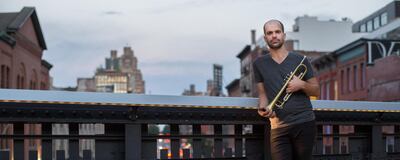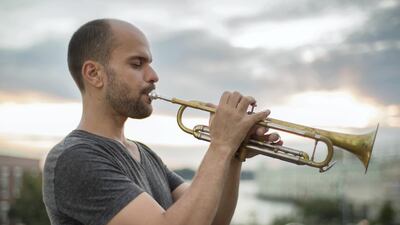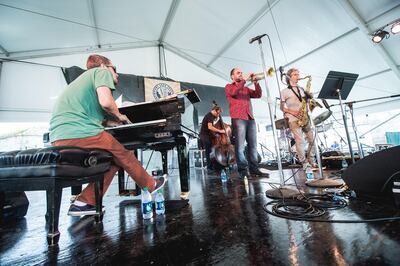As well as being the overarching term for the plaintive, improvisational and melodic Arabic music that dates back to the 14th century, maqam also translates into English as "place". Iraqi-American composer, jazz trumpeter and santur player Amir ElSaffar understands this dual meaning better than most. He grew up near Chicago and often listened to his father's jazz LPs, developing a love of Louis Armstrong and Ella Fitzgerald early on. ElSaffar's mother also taught him to play American folk songs on a ukulele. And yet, by his mid 20s, ElSaffar was heading to Iraq to learn more about maqam, mere months before the Iraq War.
"It was a tense moment," he says. "Here I was, travelling on an American passport, exploring Arabic culture, learning to speak Arabic, researching Iraqi maqam. People would ask me what I was doing – I went right into the eye of the storm."
What ElSaffar was doing, he says, was discovering the "origin of something". Not only was he learning about his ancestry, he was discovering more about the maqam of Iraq. "It maintains something ancient," he says. "It's connected to the beginnings of western and eastern music. Every sound resonates and after a while, you can almost hear Bach, Beethoven, Miles Davis, Louis Armstrong … all these musical experiences I had, I could centre in maqam."
And so began a lifelong relationship with a musical form that permeates everything ElSaffar does. Next Saturday, he will bring his Luminiscencia project, which combines flamenco, electronics and maqam, to the Shubbak Festival, London's "window on contemporary Arab culture". ElSaffar says he learnt about Spanish culture through his mother, who taught Spanish literature, while he also became sufficiently intrigued by the similarities and differences between maqam and flamenco to make four research trips to Spain. Much like his visit to Iraq, he immersed himself in the music, took lessons in harmony, learnt the form of flamenco and how its rhythmic cycles worked.
"Sometimes they're very obviously reminiscent or even have historical ties to maqam and the music of Islam," he says. "But other elements are from jazz and other western harmonic forms, especially in the 20th-century influence of [flamenco guitarist] Paco de Lucia. There are a lot of connections with African music, too, and it's a bit mysterious; nobody really knows where these patterns come from."
ElSaffar – as you might expect of someone with a degree in trumpet performance from DePaul University in Chicago – can talk all day about the musical theory and harmonic ideas behind maqam and flamenco. But the music's emotional, performative core is also important to Luminiscencia, which is supported by Abu Dhabi Festival, with flamenco dancer Vanesa Aibar playing a key part in the performance.

"Vanesa is part of the ensemble," ElSaffar says. "The sound needs to be physically embodied somehow and I wanted her to provide the visual component of that. The vibrations flow through her and she responds to them, reflecting what's happening. There's not a literal storyline to Luminiscencia, but there is a sense of progression from this deep, heavy, wide-open abyss to powerful ecstasy. And Vanesa is the focal point, where all the energy from the music coalesces."
In Spanish, this soulful, deep emotional state is called "duende", while in maqam the similar state of ecstasy is referred to as "tarab", with the idea being that the audience is put into a collective trancelike state by the music. Effectively, this is ElSaffar's aim, to loosen physical ties to a bricks-and-mortar venue and create music that engulfs his audience.
This was also the aim of his latest album, 2017's Rivers Of Sound: Not Two. It featured 17 musicians from a variety of musical traditions and combined Middle Eastern music with jazz. "I guess everything I do, even if it's other traditions and musical languages, fits into a larger 'jazz' way of life," he says. "It's always been such an open form of music and if you look at [Juan Tizol and Duke Ellington's jazz standard] Caravan there's a real connection with the Middle East, too. It might seem superficial, but it was meaningful, as was Ahmed Abdul-Malik's Jazz Sahara. People were taking little bits of information from elsewhere, incorporating them into their musical worlds and making something new and fresh out of it."
That is probably the best way to describe ElSaffar, too. When we speak, he says he has been preparing to go on a research trip to Tunisia to explore stambeli, a niche form of ritualistic sub-Saharan African music, so he can gather some musicians together for a project later in the year. Next year, he says he hopes to do something similar with South Indian musicians and the tradition of raga. "I'm branching into unknown territory and finding ways to connect it with the music I'm most familiar with," he says.
And that music is always maqam. ElSaffar says it was never his intention to use this genre, this musical way of being, to cross cultural boundaries, but because of his own heritage, it was perhaps inevitable. On his 2015 album Crisis, he used maqam and jazz to reflect on a region in turmoil. Or at least, he realised that afterwards.
“What I witnessed in the Middle East, I wanted to document and process,” he explains. “I didn’t even know I was doing it at the time; I was naming the pieces as I was playing them at the Newport Jazz Festival because it was only then I could understand what the music meant. Often there’s something much bigger going on with my music that I’m not even aware of until it’s being performed.
"I happen to be Iraqi and American and for a long time now those countries have had a relationship that has been contentious and defining for the Middle East. That's been a source of tension for me. But it's divisive. My approach is to process and express all those things through music, which is a place that can bring people together.
After all, music highlights a fundamental unity and interconnectedness.”
Amir ElSaffar will perform ‘Luminiscencia’ on July 6 at London’s Lilian Baylis Studio as part of the Shubbak Festival. For more information, visit www.shubbak.co.uk


